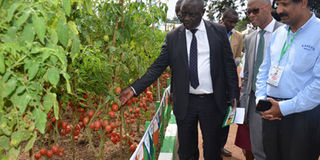Lessons you missed at the agricultural show

Agriculture minister, Vincent Ssempijja inspects tomatoes in a greenhouse at the Jinja agricultural show ground. photo by Tausi Nakato
What you need to know:
From orange fleshed value addition to solar grain drying and dairy feed making, innovators have come up with various machines to boost your production on the farm, writes Tausi Nakato.
The 27th National Agricultural Show organised by Uganda National Farmers Federation (UNFFE) at the Jinja showgrounds ended last week.
The event attracted hundreds of farmers, researchers, exhibitors, innovators, students and ordinary show-goers, both young and old.
Among the things that stood out at the week-long event were new varieties of seeds, fertilisers, agrochemicals, artificial insemination services and farm machineries.
A team from Seeds of Gold attended the event and unveils some of the innovations and varieties of common crop seeds that were on show to help increase your production.
Maize seed varieties
The various varieties of crop seeds showcased at the event were suited for all regions of the country.
William Odong, a researcher at Bulindi Zardi, said maize varieties such as Longe 5 and 10 would do very well in western and central Uganda.
The agronomist advised farmers to plant drought tolerant maize variety. Odong will be among the experts to train farmers next week at the Seeds of Gold Farm Clinic in Hoima District.
But even as they embrace hybrid seeds, the experts said farmers have to guard against pest and diseases and embrace good agronomic practices.
Currently, the fall armyworm is the biggest threat to production of maize. Odong noted most farmers have not understood the biology of fall armyworm. “You need to scout the field early to see any traces of pests. Preventive measures include spraying to minimise the impact of the fall armyworm,” he said.
When spraying, farmers should ensure that the spray goes down to the funnel of the plant.
He continued: “Alternate the chemicals with different actions. If one is an insect regulator, it can control the eggs and the other can control the adults. Most farmers face a challenge in striking a balance when trying to control the eggs, larvae and adult stages of the armyworm.”
To defeat striga weed, which is common, the agronomist said farmers should plant hybrid maize seed, which is coated with a herbicide that curbs the weed.
Beans
With limited land available, farmers were urged to embrace climbing beans, which offer higher yields compared to field beans.
Traditional field beans give farmers eight to 10 bags per acre while the climbing beans have the potential to yield 15 bags.
With climbing beans, farmers will need 10 kilogrammes of climbing seeds per acre while with the field one, one uses up to 30 kilogrammes.
Rice
Apart from the irrigated rice, which is common farmers can plant the Nerica rice variety.
Varieties such as Nerica 1, Nerica 4, Nerica 10 and Nerica 11 do well. These varieties are being planted in upland or medium altitude areas, but one doesn’t have to use water for irrigation.




